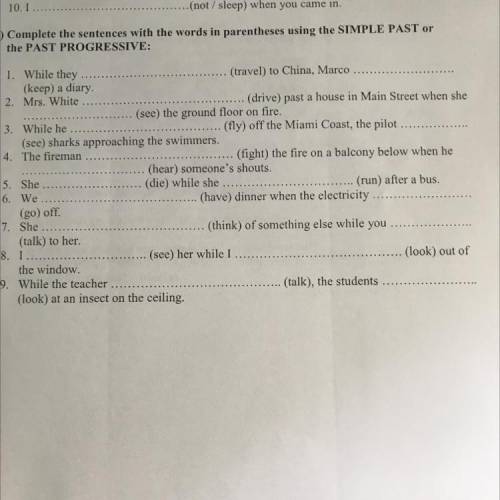B) Complete the sentences with the words in parentheses using the SIMPLE PAST or the PAST PROGRESSIVE:
1. While they
(travel) to China, Marco
(keep) a diary.
2. Mrs. White
(drive) past a house in Main Street when she
(see) the ground floor on fire.
3. While he
(fly) off the Miami Coast, the pilot
(see) sharks approaching the swimmers.
4. The fireman
(fight) the fire on a balcony below when he
(hear) someone's shouts.
5. She
(die) while she
(run) after a bus.
6. We
(have) dinner when the electricity
(go) off.
7. She
(think) of something else while you
(talk) to her.
8. I...
(see) her while I
(look) out of
the window.
9. While the teacher
(talk), the students
(look) at an insect on the ceiling.

Другие вопросы по теме Английский язык
Популярные вопросы
- Верных ответов 2Пищевая сеть образования пищевыми цепями.Солнце- источник...
3 - Питинисница ехала очень быстро и гонки питинисю соревновались. Питинисница...
2 - , я проспала, а сделать вообще не успеваю. ...
3 - это С/Р нужда в скобках писать цвета >...
1 - нужна с алгеброй. Решите задачи...
1 - Choose the correct word. 8tres.fit.JinUHHi, I m Paul. I m twelve years...
3 - До іть з питаннями із зарубіжньої літератури: 1)Напередодні якого свята...
3 - 2+2 забирай балы газдоровье это я просто так ...
2 - Как вы думаете, почему в начале произведения Н. Гоголя не называет департамент,...
2 - добрые люди, буду благодарна...
1
Explanation: The phrase "While they were traveling" indicates a continuous action in the past. The verb "keep" is used in the past progressive form "was keeping" to show that Marco was continuously writing in his diary during their trip to China.
2. Mrs. White was driving past a house in Main Street when she saw the ground floor on fire.
Explanation: The verb "drive" is used in the past progressive form "was driving" to show that the action was happening at a specific point in the past. The verb "see" is used in the simple past form "saw" to indicate a completed action of noticing the fire.
3. While he was flying off the Miami Coast, the pilot saw sharks approaching the swimmers.
Explanation: The verb "fly" is used in the past progressive form "was flying" to indicate an ongoing action. The verb "see" is used in the simple past form "saw" to show that the pilot noticed the sharks at a specific point in the past.
4. The fireman was fighting the fire on a balcony below when he heard someone's shouts.
Explanation: The verb "fight" is used in the past progressive form "was fighting" to indicate a continuous action. The verb "hear" is used in the simple past form "heard" to show that the fireman received the sound of someone shouting at a specific moment in the past.
5. She died while she was running after a bus.
Explanation: The verb "die" and "run" are both used in the past progressive form to indicate ongoing actions in the past. The word "while" connects the two actions and suggests that the running action was still happening at the time of her death.
6. We were having dinner when the electricity went off.
Explanation: The verb "have" is used in the past progressive form "were having" to indicate an ongoing action. The conjunction "when" suggests that the electricity going off happened at a specific moment in the past.
7. She was thinking of something else while you were talking to her.
Explanation: The verb "think" is used in the past progressive form "was thinking" to indicate an ongoing action. The verb "talk" is also used in the past progressive form "were talking" to show that the action of talking was happening at the same time as her thinking.
8. I saw her while I was looking out of the window.
Explanation: The verb "see" is used in the simple past form "saw" to indicate a completed action of noticing her. The verb "look" is used in the past progressive form "was looking" to show that the action of looking was happening continuously in the past.
9. While the teacher was talking, the students were looking at an insect on the ceiling.
Explanation: The verbs "talk" and "look" are both used in the past progressive form to indicate ongoing actions in the past. The word "while" connects the two actions and suggests that the students were continuously looking at the insect while the teacher was speaking.